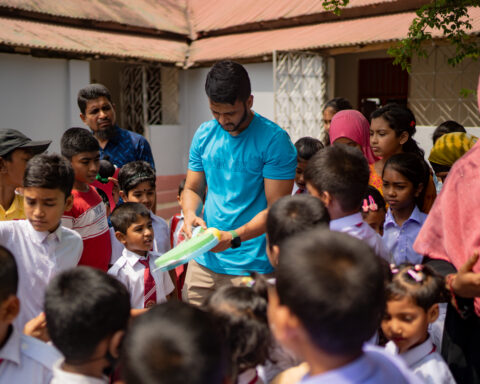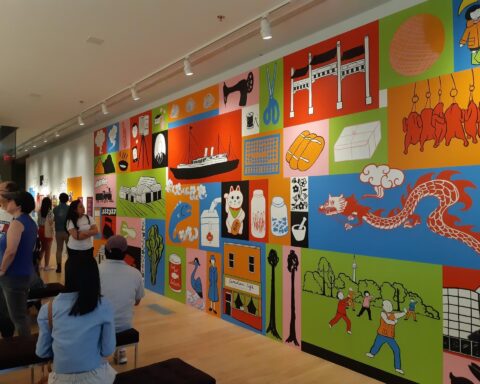Canadian retailers and governments appear to have learned some lessons following the tragic Rana Plaza Factory collapse in April 2013, but much more is needed to protect the health and safety of garment workers overseas, say Canadian activists.
The accident, considered to be the worst in garment industry history in the world, killed more than 1,110 people and injured around 2,500 in Savar, on the outskirts of the Bangladesh capital city Dhaka. April 24 marks the second anniversary of the collapse.
Some of the Canadian retailers that source their textile products from the factories in Bangladesh came forward to help the victims and their families immediately after the disaster.
The retailers, as well as the Canadian government, have also launched some initiatives to establish a safe working environment for the millions of workers in Bangladesh, but labour and human rights organizations and activists feel that a great deal of work is yet to be done.
Canadian Retailers’ Social Responsibility
Emily Norgang, a senior researcher at the Canadian Labour Congress, the national voice of the Canadian labor movement, says Canadian retailers need to play a more active role.
“All the Canadian brands that import garments from Bangladesh should not forget their social responsibility. They must come forward to contribute to the Rana Plaza fund,” she says.
[O]nly one Canadian company – Loblaws – has contributed to the fund, out of the 130 Canadian retailers that buy garment products from the factories in Bangladesh.
After the collapse, an international trust fund was created to support the survivors and the families of those who died in the accident. The fund reached $21 million US, but is still $19 million short of its target.
According to the Rana Plaza Donors Trust Fund list, only one Canadian company – Loblaws – has contributed to the fund, out of the 130 Canadian retailers that buy garment products from the factories in Bangladesh.
Bangladesh is the second largest garment exporter in the world. More than four million people work in the apparel sector and 80 per cent of them are women. Most of the workers earn an average of $68 US per month.
Fight for Compensation
Repon Chowdhury is the Executive Director of the Bangladesh Occupational Safety, Health and Environment Foundation, an NGO dedicated to workers’ rights. He says a lot of money is needed to run the compensation and rehabilitation program.
“Almost two years have passed, but the victims’ families haven’t received the compensation money yet. There are more than 2,000 permanently disabled workers who have to be taken care of as well,” he explains.
After the Rana Plaza tragedy, international retailers and labour unions developed two major initiatives to prevent a similar catastrophe.
One is the Bangladesh Accord on Fire and Building Safety and the other is the Alliance for Bangladesh Worker Safety. Both agreements are aimed at ensuring garment products are being sourced from regularly audited and unionized factories.
At present, the Accord includes 166 international retailers, while the Alliance includes 26 from North America.
“We have our responsibility towards the workers who make clothes for the Canadians. We must not turn a blind eye to the welfare of millions of workers in Bangladesh.” – Emily Norgang, Canadian Labour Congress
The majority of Canadian retailers have not responded to the call of the international labour organizations to join the agreements as well.
Out of the 130 Canadian retail companies with ties to Bangladesh, only Loblaws and Brüzer Sportsgear Ltd have signed the Accord.
“We have our responsibility towards the workers who make clothes for the Canadians,” Norgang says. “We must not turn a blind eye to the welfare of millions of workers in Bangladesh.”
Norgang adds that the Canadian government should step forward to make the retailers behave more responsibly.
“The government has to insist the retailers disclose the names of the factory suppliers and the workers’ safety and welfare related information.”
Canadians Should Demand Regulations
New Democratic Party (NDP) Member of Parliament (MP) Matthew Kellway represents the Bangladeshi-Canadian populated Beaches-East York riding in Toronto and says the government must intervene to establish ethical sourcing of textile products.
Kellway visited the Rana Plaza site last year and was moved by the suffering of the low-paid garment workers.
He tabled a motion in Parliament in May 2014, asking for information with regard to suppliers of garments and textiles imported from other countries.
He says he was surprised to find that more than a dozen federal government departments and agencies, such as the Department of National Defence, the Canadian Armed Forces and the Canadian Coast Guard had no clue where their uniforms came from.
“There should be laws to monitor the global supply chain of the retailers so that factories without proper safety measures cannot operate. That’s how we can try to prevent another Rana Plaza tragedy.” – Matthew Kellway, NDP MP
The government must make a policy that ensures that Canadian retailers and government agencies are not buying any clothes that are made in an unsafe factory or by using child labour, he adds.
“We must ensure there is transparency and accountability in the sourcing of garment products,” he says. “There should be laws to monitor the global supply chain of the retailers so that factories without proper safety measures cannot operate. That’s how we can try to prevent another Rana Plaza tragedy.”
Kellway commends the government’s participation in an international effort to improve working conditions in the ready-made garment sector of Bangladesh, saying it is a good step.
The International Labour Organization is implementing a project jointly funded by Canada, the Netherlands and the U.K. to provide rehabilitation and skills training for the Rana Plaza victims and to also help Bangladesh build its capacity to ensure the factories are safe.
The Canadian government could put pressure on Bangladeshi garment manufacturers and exporters by setting a standard that they must meet if they want to qualify for Canada’s existing tariff concession program, Kellway explains.
Under the tariff concession program, Bangladesh and other developing countries enjoy an 18 per cent duty advantage for apparel export in Canada.
“This is not to put Bangladesh in trouble but to create a pressure on the factory owners so that they make a serious effort to improve working conditions for the workers,” Kellway says.
“This will also give a message to the retailers that the Canadian government wants them to play their part in creating safe and appropriate working conditions in Bangladesh. It’s a long way and we all must act.”





